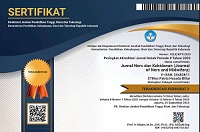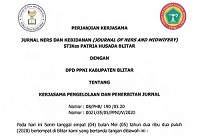Calgary Family Assessment Model (CFAM) Keluarga tentang Penanganan Pertama Food Borne Disease Anak
DOI:
https://doi.org/10.26699/jnk.v2i3.ART.p255-262Keywords:
Family Asessment Calgary, First Handling, Foodborne DiseaseAbstract
Food borne disease (FBD) is a disease through consumption of contaminated food. The problem is that, school children are vulnerable to FBD because of household food contamination. This indicates the family as a food handler hygiene mainly the mother who prepare the food needed to be improved. Most common FBD is diarrhea, one of the danger is that the child’s body fluids are expelled out through the stool this can cause dehydration or even death. Family plays very important role in the handling of FBD first before being taken to the health service. This can be known through family studies approach CFAM (Calgary Family assessment model). The design of this study was descriptive eksplorative with a sample of 35 respondents; the 4th graders and their parents (17 persons) and 5th graders and their parents (18) in Jatirejoyoso Kepanjen Elemetary School through purposive sampling technique. The data taken were demographic and CFAM consists of the structural assessment components, development as well as family function. The family in first handling of food borne disease largely was not routine (71.4%). Ways of solving the problems mostly by the head of the family (74.3%). Responsible care for sick children mostly (57.2%) by only one parent (father / mother). Follow up during sick mostly made an effort (curative) as much as 85.7%. Family belief the majority (80%) considered that the first treatment at home was not needed because it could be taken directly to the health service. Health workers are expected to provide guidance for families through health volunteers on first handling practices of FBD. While schools are expected to perform optimization of UKS (School Health Unit) program to provide health education about the prevention and first treatment of FBD toward the school community.References
Azwar, S.2010. Sikap Manusia, Teori dan Pengukurannya.
Yogyakarta: Pustaka Pelajar.
Jurnal Ners dan Kebidanan, Volume 2, Nomor 3, Desember 2015, hlm. 255–262
Barakki, N., et al. 2005. Food Borne Disease. Haramaya
University, Usaid In Collaboration Wiyh The
Ethiopia Public Health Training Initiative, The
Carter Center, The Ethiopia Ministry Of Health
And Education. Module. Ethiopia.
BPOM. 2010. Info POM Badan Pengawas Obat Dan
Makanan Republik Indonesia Volume XI, No
Mei-Juni 2010, ISSN 1829-9334.
Kholid, A. 2015. Promosi Kesehatan dengan Pendekatan
Teori Perilaku, Media dan Aplikasinya. Jakarta:
Raja Grafindo Persada.
Maulana, H. 2013. Promosi Kesehatan. Jakarta: EGC.
Puspitasari, H. 2006. Pengaruh Sosial Ekonomi,
dukungan keluarga terhadap kenakalan remaja
di kota Bogor. Disertasi Institut Pertanian Bogor
(Karya tidak dipublikasikan)
Riskesdas. 2013. Riset Kesehatan Dasar. Badan Penelitian
dan Pengembangan Kesehatan Kementrian
Kesehatan RI: Jakarta.
Solikhah, H. 2013. Gambaran Perilaku Hidup Bersih dan
Sehat Tentang Food Borne Disease Pada Anak
Usia Sekolah di SDN Babat Jerawat I Kecamatan
Pakal Kota Surabaya.
Suci, E.S.T. 2009.Gambaran Perilaku Jajan Murid sekolah
dasar di Jakarta. Jurnal Psikobuana-jurnal ilmiah
psikologi, vol 1, no.1, 29-38. Universitas Katolik
Atma Jaya Jakarta, ISSN 2085-1242.
Taufik, M. 2007. Prinsip-Prinsip Promosi Kesehatan
dalam Bidang Keperawatan. Jakarta: Infomedika.
WHO. 2009. Diarrhoea :Why Children Are Still Dying
And What Can Be Done.Unicef.
WHO. 2005. Penyakit Bawaan Makanan; Fokus
Pendidikan Kesehatan. Jakarta: EGC.
Widoyono. 2011. Penyakit Tropis Epidemiologi, Penularan,
Penanganan Pertama dan Pemberantasannya.
Edisi 2. Jakarta: Erlangga.
Wong, D.L. 2009. Buku Ajar Keperawatan Pediatric
Edisi 6. Jakarta: PT Indeks.
Wright, M., and Leahey, M. 2009. Nurses And Families
A Guide To Family Assessment And Intervention,
Second Edition, Ta. Davis Company, Philadelphia.
Downloads
Published
How to Cite
Issue
Section
License
Copyright (c) 2015 Jurnal Ners dan Kebidanan (Journal of Ners and Midwifery)

This work is licensed under a Creative Commons Attribution-ShareAlike 4.0 International License.






